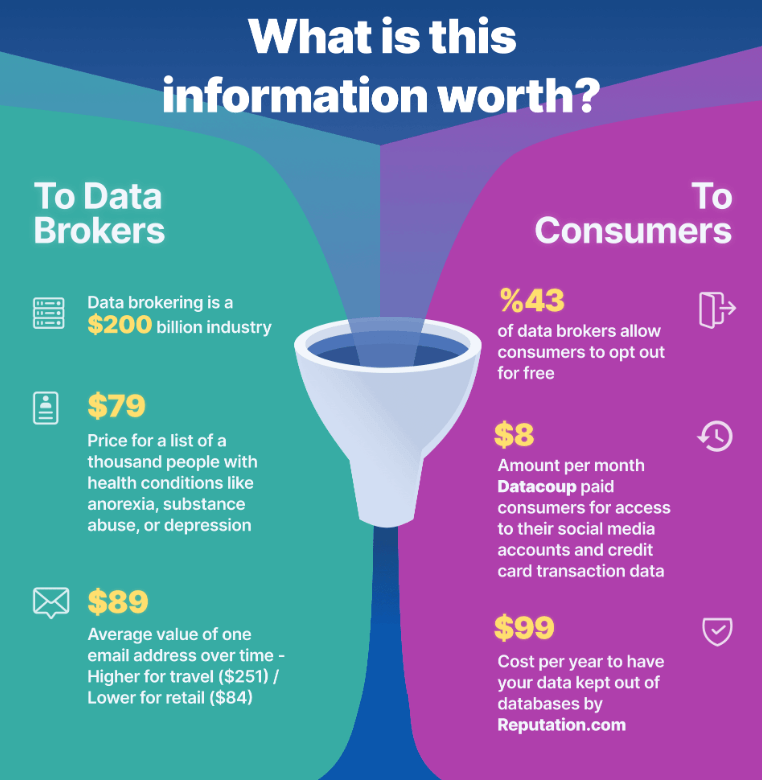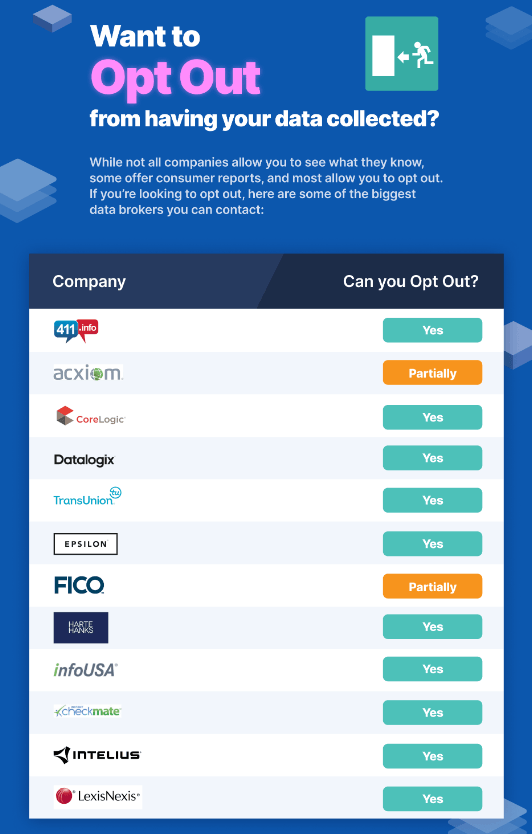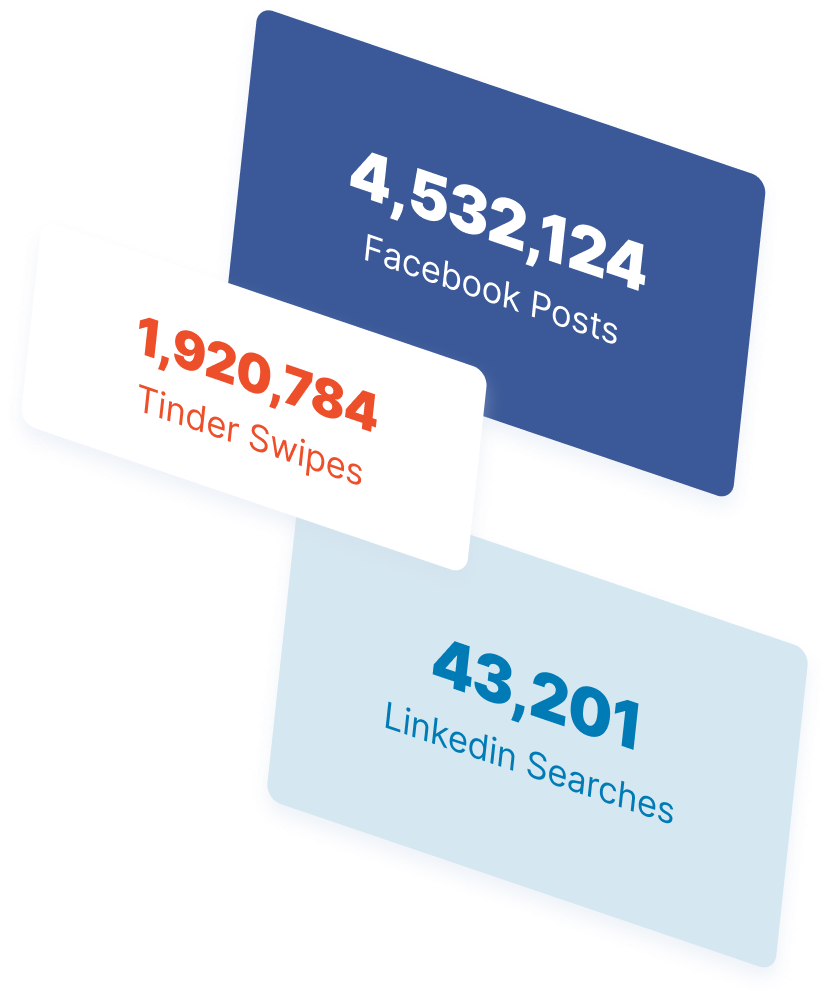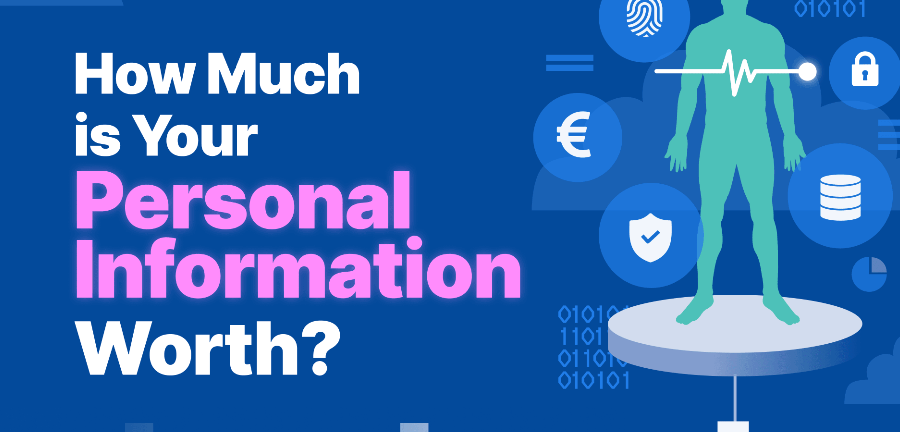-
 5 min. read
5 min. read
-
 WebFX Team
WebFX Team Digital Marketing Agency
Digital Marketing Agency
- The WebFX team is made up of more than 450 subject matter experts in digital marketing, SEO, web design and web development, social media, and more. Together, they’ve helped WebFX’s clients earn more than $3 billion in revenue from the web — and that’s just in the past five years. @webfx
Have you ever received an advertisement in the mail and been impressed by eerily relevant it was to your exact interests or situations? You may have chalked it up to coincidence, but that kind of accuracy probably didn’t happen by chance. What’s more likely is that the business purchased your information from a data broker.
If you’re familiar with data brokers, this won’t come as a shock. But if you’re not already aware, data brokering is a multi-billion dollar industry made up of companies who collect consumer data and sell it to other companies, usually for marketing purposes. So what do they know about you?
And how much do they make off of your personal information? Check out our infographic for all the details.
What are data brokers?
Let’s start with some background information on data brokers. Essentially, they are companies that collect information from public records, online activity, and purchase history and re-sell it to other companies for marketing purposes.
The more companies know about consumers, the more targeted (and successful) they can make their advertisements, so data brokers try to collect as much information as they can.  Today, there are over 4,000 data brokering companies worldwide. Acxiom, one of the largest, has 23,000 servers collecting & analyzing consumer data, Data for 500 million consumers worldwide, and up to 3,000 data points per person – and that’s just one company.
Today, there are over 4,000 data brokering companies worldwide. Acxiom, one of the largest, has 23,000 servers collecting & analyzing consumer data, Data for 500 million consumers worldwide, and up to 3,000 data points per person – and that’s just one company.
But where do they get this information? Over 1,400 “leading brands” sell information from store loyalty cards to data brokers, meaning that if you’ve ever signed up for a loyalty or store credit card at one of your favorite stores, there’s a good chance the data you provided was sold to a broker. Depending on the store you signed up at, you could be added to a variety of different databases.
For example, if you signed up for a loyalty card at a pet store, your information might be sold to companies looking to market to pet owners. Although it is a relatively new industry, data brokers already have information for a pretty sizable amount of the population. In fact, 80% of U.S.
email addresses are on file on Towerdata, and 38% of employed Americans’ pay stub information is available on Equifax. In addition, databases like CampaignGrid and ProPublica have political information including party affiliation and campaign contributions for 80% of registered American voters. It’s pretty safe to assume that at least some of your data is on file with brokers.
Now let’s look at how much that information is worth to data brokers – and what it might be worth to you.
What is this information worth?

To data brokers:
As it turns out, consumer data is worth a lot of money. The average email address is worth $89 to a brand over time, so it makes sense that they are willing to pay for that kind of information. Now, data brokering is a $200 billion industry, and it isn’t showing any signs of becoming any less profitable. But how do they make their money?
Different companies operate in different ways, but they generally sell the information in the form of lists of contact information for people that fall into specific categories. Most of the time, these lists are sorted by interests and characteristics, like “fitness enthusiasts” or “new parents.” In some cases, however, the lists are a bit more questionable. One company actually sold lists with information from 1,000 people with health conditions like anorexia, substance abuse, and depression for $79.
To consumers:
Although consumers don’t stand to gain as much as data brokers from their personal information, they aren’t completely powerless.
43% of data brokers allow consumers to opt-out for free, which can be time-consuming, but worth the effort if you don’t like the idea of your data being sold. If you’re really serious about your privacy, for $99/year, reputation.com will keep your data out of databases entirely. On the other hand, if you’re fine with it and just want to get in on the profits – there are ways to do that, too. Datacoup paid consumers $8/month for access to their social media accounts and credit card transaction data in a trial, and although that program is no longer running, there’s a chance that other companies will follow their lead in the future.
If you fall into the category of consumers uncomfortable with having their data collected, you’ll find this next section helpful.
Want to opt-out from having your data collected?
 While not all companies allow you to see what they know, some offer consumer reports. One of the most notable is Acxiom’s site, About the Data, which allows you to see all the data points they have for you and correct any information that is incorrect. And although most of the others do not provide the same service, here are some of the biggest data brokers you can contact to opt-out of having your data collected:
While not all companies allow you to see what they know, some offer consumer reports. One of the most notable is Acxiom’s site, About the Data, which allows you to see all the data points they have for you and correct any information that is incorrect. And although most of the others do not provide the same service, here are some of the biggest data brokers you can contact to opt-out of having your data collected:
- 411.info – allows full opt-out
- Acxiom – allows partial opt-out
- CoreLogic – allows full opt-out
- DataLogix – allows full opt-out
- eBureau – allows full opt-out
- Epsilon – allows full opt-out
- FICO – allows partial opt-out
- Harte Hanks – allows full opt-out
- infoUSA – allows full opt-out
- Instant Checkmate – allows full opt-out
- Intelius – allows full opt-out
- LexisNexis – allows full opt-out
What is your personal information worth?: the full infographic
 Share This Graphic On Your Site
Share This Graphic On Your Site
-
 The WebFX team is made up of more than 450 subject matter experts in digital marketing, SEO, web design and web development, social media, and more. Together, they’ve helped WebFX’s clients earn more than $3 billion in revenue from the web — and that’s just in the past five years.@webfx
The WebFX team is made up of more than 450 subject matter experts in digital marketing, SEO, web design and web development, social media, and more. Together, they’ve helped WebFX’s clients earn more than $3 billion in revenue from the web — and that’s just in the past five years.@webfx -

WebFX is a full-service marketing agency with 1,100+ client reviews and a 4.9-star rating on Clutch! Find out how our expert team and revenue-accelerating tech can drive results for you! Learn more
The Internet in Real Time
Ever wonder how much is going on at once on the Internet? It can be tough to wrap your mind around it, but we’ve put together a nice visual that’ll help! The numbers show no sign of slowing down either.
Find out More

Ready to Drive Results for Your Business?
See how WebFX uses SEO, PPC, Social Media, and Web Design to Drive Revenue for Businesses.
Get InspiredThe Internet in Real Time
Ever wonder how much is going on at once on the Internet? It can be tough to wrap your mind around it, but we’ve put together a nice visual that’ll help! The numbers show no sign of slowing down either.
Find out More





